
TBD
- Subject:
- Environmental Science
- Material Type:
- Assessment
- Diagram/Illustration
- Interactive
- Module
- Author:
- Colbe Wilson
- Eddie Brasher
- Laura Armstrong
- Date Added:
- 04/22/2023

TBD

This resource seeks to equalize access to learning materials that address the subject of human impact on the environment. The design of this resource is structured in a manner that will allow it to be adapted and further destributed. This particular module examines climate change, specifically human impact on the environment. Specific topics include: Climate Change, Weather vs. Climate, Causes of Climate Change (including Natural, Human Impact, and the Greenhouse Effect), Global Warming, and Mitigating Solutions to the Climate Crisis
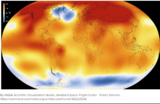
Climate change has been a hot topic lately. Scientists have been studying changes in the Earth’s climate over time. In this seminar you will learn about how and why Earth’s climate is changing. By the end of this seminar, you will be able to think reflectively about ways you can help lessen the changes in Earth’s climate.Standards3.3.4.A5Describe basic weather elements. Identify weather patterns over time.
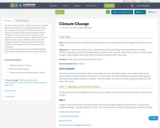
The goal of this unit is for students to work in a blended learning environment to understand climate change and its impact on the world. The objectives are for students to master a basic understanding of climate change and to work in groups to research focused questions, present their research, and propose a way to combat climate change. Students will present their completed projects to their classmates. This unit is based on a lesson plan from The Learning Network found here: http://learning.blogs.nytimes.com/2015/04/22/guest-post-climate-change-questions-for-citizen-scientists/

This is a lesson/handout on climate change for very young elementary school students.

Climate change lesson plan
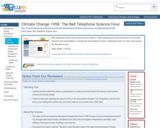
Bell Telephone Science Hour produced this video in 1958, explaining how the production of CO2 from factories and automobiles is causing the atmosphere to warm, melting the polar ice caps, and causing the sea level to rise.

In a world where climate change has never been experienced, it is time to do something. This poster aims to encourage people to act, by raising awareness of the importance of talking about climate change. This poster highlights the respect for nature by using powerful images and colors.

This course has been designed to help professionals working across multiple disciplines bring a climate change adaptation lens to their current and future projects.
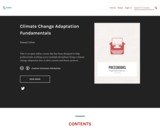
Short Description:
This is an open online course that has been designed to help professionals working across multiple disciplines bring a climate change adaptation lens to their current and future projects.
Long Description:
This course has been designed to help professionals working across multiple disciplines bring a climate change adaptation lens to their current and future projects. It’s structured in four modules, that cover: what the current climate change situation is, including the latest science and scenarios; why climate change matters to professionals and planners, in terms of risk and impact; what we can do about it, through examples and methods of adaptation, and; how to bring adaptation tools, data and processes into your work, with a practice project.
This course is part of the Adaptation Learning Network led by the Resilience by Design Lab at Royal Roads University. The project is supported by the Climate Action Secretariat of the BC Ministry of Environment & Climate Change Strategy and Natural Resources Canada through its Building Regional Adaptation Capacity and Expertise (BRACE) program. The BRACE program works with Canadian provinces to support training activities that help build skills and expertise on climate adaptation and resilience.
Word Count: 4985
(Note: This resource's metadata has been created automatically by reformatting and/or combining the information that the author initially provided as part of a bulk import process.)
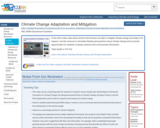
In this short video, learn about actions that humans can take to mitigate climate change and adapt to its impacts. Use this resource to stimulate thinking and questions about climate change and to provide opportunities for students to design solutions and communicate information.
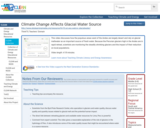
This video discusses how the populous areas west of the Andes are largely desert and rely on glacial meltwater as an important source of fresh water. Because the Peruvian glaciers high in the Andes are in rapid retreat, scientists are monitoring the steadily shrinking glaciers and the impact of their reduction on local populations.
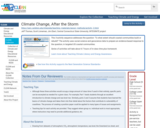
This 3-activity sequence addresses the question: "To what extent should coastal communities build or rebuild?" The activity uses social science and geoscience data to prepare an evidence-based response to the question, in targeted US coastal communities.
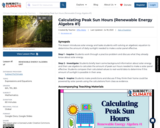
This lesson introduces solar energy and tasks students with solving an algebraic equation to determine the amount of daily sunlight needed to make a solar panel effective.
Step 1 - Inquire: Students work through a practice problem and discuss what they already know about solar energy.
Step 2 - Investigate: Students briefly learn some background information about solar energy and then use algebra to calculate the amount of peak sun hours needed to make a solar panel effective. Students compare their calculated values to real-world data to determine if this amount of sunlight is possible in their area.
Step 3 - Inspire: Students make predictions and discuss if they think their home could be powered by solar panels using the calculations from class as evidence.
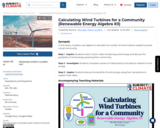
In this lesson, students use algebra to calculate the number of wind turbines needed to power a local community.
Step 1 - Inquire: Students watch a short video introducing wind energy and discuss the possibility of wind energy powering their community.
Step 2 - Investigate: Students complete a series of mathematical calculations related to wind energy.
Step 3 - Inspire: Students discuss the benefits of wind energy using their calculations to support their ideas.
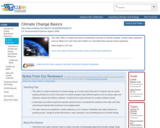
The video offers a simple and easy-to-understand overview of climate change. It poses basic questions such as 'What is it?' and 'How will it effect us?' and effectively answers those questions.
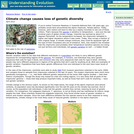
If you'd visited Tuolumne Meadows in Yosemite National Park 100 years ago, you probably would have encountered the alpine chipmunk, Tamias alpinus. Today, however, park visitors will have to hike up a nearby mountain to see one of these critters. That's because this species is sensitive to temperature and over the last hundred years of global climate change, Yosemite has warmed by about 5.5 degrees Fahrenheit. As the temperature increased, the chipmunks retreated to higher and higher elevations where it was cooler. Today, they occupy a fraction of their original range. If climate change continues, they could be squeezed right off the tops of their mountains and out of existence.
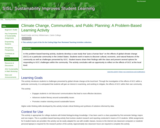
In this problem-based learning activity, students develop a case study that "puts a human face" on the effects of global climate change (GCC) on a particular community in the United States. Students work in teams to: discover cultural, economic, and natural features of the community; identify challenges presented by GCC; and identify options for responding to these challenges.
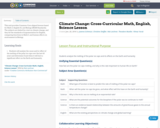
This unit provides Common-Core aligned lessons based for Math 3, English 10, and Biology (NGSS Standards). The subjects are linked by a text on climate change, and they hit the standards of argumentation for English, comparing functions in Math 3, and human effects on environment in Biology.
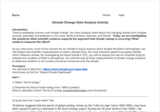
Students research climate data and play the role of a scientist trying to interpret the condition of Earth's atmosphere.